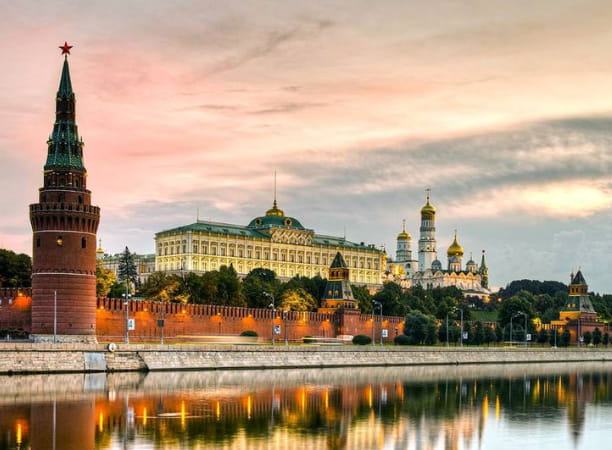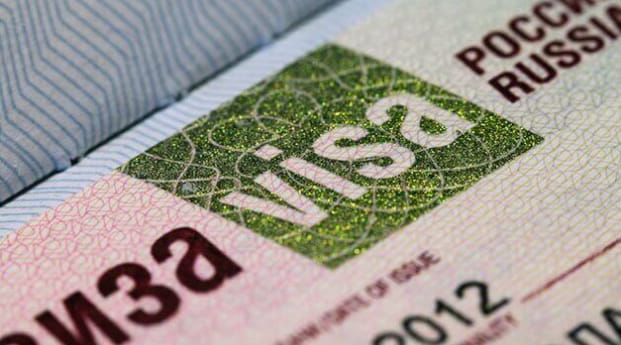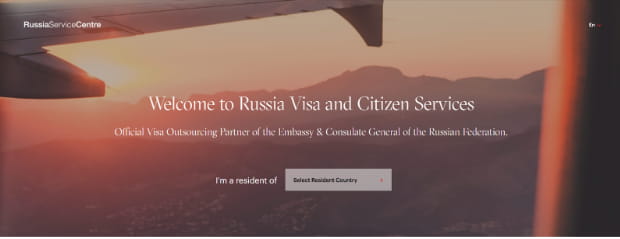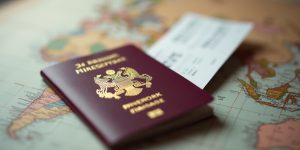Can Americans Travel To Russia? The U.S. Department of State currently advises Americans not to travel to Russia, making visits much more complicated for U.S. citizens.
Banks, flights, and visa services are heavily affected by sanctions and diplomatic tensions, creating challenges for Americans considering a trip.
If you’re planning to visit, it’s essential to understand the current travel restrictions, safety risks, and visa requirements before making any arrangements.
Can Americans Travel To Russia Now?
Technically, Americans can still travel to Russia, but the U.S. State Department strongly advises against it.
The State Department warned Americans, “Do not travel to Russia for any reason,” issuing a Level 4 advisory.
This represents the highest level of travel warning, indicating extreme danger.
Russian consulates continue to process visa applications, and borders remain open for tourism, although practical challenges persist.
USA Travel To Russia (Levels)
The U.S. State Department maintains a four-level travel advisory system, with Russia currently at Level 4: Do Not Travel.
This designation places Russia in the same category as active war zones and countries with extreme security risks.
Level 4 Advisory Components:
- Immediate departure is recommended for all Americans currently in Russia
- No travel is recommended for any purpose
- Extremely limited consular assistance available
- High risk of arbitrary detention and harassment
Reasons Why Americans Can’t Travel To Russia Right Now
Several critical factors make travel to Russia highly hazardous to Americans.
The risk of harassment or wrongful detention by Russian security officials, the arbitrary enforcement of local laws, and the possibility of terrorism tops the list of State Department concerns.

Russian authorities have repeatedly detained Americans on questionable charges, using them as political leverage in U.S.-Russia disputes.
Financial and logistical barriers compound these risks. U.S. credit and debit cards no longer function in Russia due to banking sanctions.
Air travel requires complex routing through third countries, with limited flight options.
The U.S. Embassy in Moscow operates with minimal staff, severely limiting assistance capabilities for Americans in distress.
Thinking about traveling to Mexico? Get the latest safety insights and travel advice in Is It Safe to Travel to Mexico?
Visa Options For Americans In 2025 When It’s Safe
Despite current restrictions, understanding visa options remains important for future travel planning when conditions improve.
Electronic Visa (eVisa)
Russia offers electronic visas for short-term visits up to 16 days.
The eVisa costs approximately $52 and is processed in about four days.
However, this option doesn’t allow entry to Belarus under the mutual recognition agreement.

Americans must provide a valid passport, a digital photo, and comprehensive health insurance covering Russian territory.
Traditional Visa (Consulate or Visa Centre)
For longer stays or multiple entries, traditional visas remain necessary. Single-entry visas cost around $102, while multiple-entry options reach $254.
Processing takes two weeks for standard applications.

Americans need invitation letters, travel insurance, and passport photographs. Current processing continues despite diplomatic tensions.
Mutual Recognition of Visas with Belarus
Since January 2025, Russia and Belarus have maintained a mutual visa recognition agreement, Ministry of Foreign Affairs of the Republic of Belarus, 2025.
Traditional Russian visas (not eVisas) allow entry to Belarus without additional documentation.
This arrangement opens combined travel opportunities through both countries, though current security conditions make such trips inadvisable.
Travelling to Russia Without a Visa
Certain nationalities are exempt from visa requirements for Russian travel, but Americans aren’t included in this exemption.
U.S. citizens must obtain proper visa documentation regardless of travel purpose or duration. Attempting entry without appropriate visas results in immediate deportation.
Travel Insurance in Russia: Your Most Critical Travel Document
Travel insurance becomes mandatory for Russian visa applications, but finding coverage proves challenging.
Most Western insurance companies exclude Russian coverage due to sanctions.
Russian companies like Solidarity accept foreign payment cards and meet embassy requirements.
Without proper insurance, visa applications face automatic rejection, making this document essential for any future travel planning.
How Much Does It Cost to Travel in Russia?
Russia generally offers affordable travel compared to Western Europe, with current exchange rates around 90 rubles per dollar.
Budget travelers can manage on $40 daily, while comfortable travel requires $60-80.
Accommodation in Russia ranges from $7 hostels to $50 hotels. Restaurant meals cost $5-15, with transportation remaining inexpensive.
However, cash-only transactions due to banking restrictions significantly complicate financial planning.
Also, If You’re planning a trip to Italy? Find out if you need a visa for Italy in our complete guide.
2025 Updates for Americans Traveling to Russia
Key changes in 2025 affecting Americans traveling to Russia include new visa rules, flight updates, and safety advisories.
| Update Area | What’s New in 2025 |
|---|---|
| Visa-Free Entry | Digital pre-registration via RuID app, mandatory QR code for visa-exempt travelers |
| Direct Flights | Discussions underway to resume direct U.S.–Russia flights by late 2025 |
| Entry Documentation | Required tour company confirmation letter and potential health checks |
| Safety Advisory | U.S. State Dept. maintains Level 4 warning, strongly discouraging travel |
What Not to Do in Russia as an American
- Ignore Travel Advisories: Disregarding the U.S. State Department’s Level 4 “Do Not Travel” warning can put you at serious risk.
- Engage in Political Discussions or Protests: Avoid public demonstrations, protests, or political debates, as these can lead to detention.
- Post Sensitive Content Online: Social media posts critical of Russia or related to the conflict can attract legal trouble.
- Assume Embassy Assistance: U.S. consular support is limited, so don’t rely on it in emergencies.
- Use Sanctioned Payment Methods: Credit/debit cards may not work, and U.S. bank transfers are restricted.
- Break Local Laws: Be mindful of photography rules, restricted areas, and other local regulations.
Risk Assessment by Region
- Moscow: Moderate risk – generally safe for tourists, but stay alert in crowded areas; follow local laws strictly.
- St. Petersburg: Moderate risk – similar to Moscow; avoid political demonstrations and large gatherings.
- Border regions (with Ukraine): High risk – avoid travel due to ongoing conflict and military activity.
- Crimea: Very high risk – entry is illegal for U.S. citizens under U.S. law; high chance of detention or arrest.
- North Caucasus (Chechnya, Dagestan, Ingushetia): Very high risk – unstable security situation; avoid travel entirely.
Related Read:
Conclusion: Travel Advisory for Americans Visiting Russia in 2025
Due to ongoing safety, legal, and financial risks, travel to Russia is strongly discouraged for Americans in 2025. The U.S. State Department maintains a Level 4 “Do Not Travel” advisory, and consular services are limited. Flights are disrupted, banking services are restricted, and sanctions make basic transactions challenging. Reports of wrongful detentions and strict enforcement of local laws further increase the risks.
Even in major cities, the overall situation remains unsafe. Unless travel is essential, Americans should postpone trips. If travel cannot be avoided, it is crucial to seek proper legal, security, and travel guidance beforehand.
FAQs
Allowed, but highly discouraged due to safety, legal, and diplomatic risks.
Risky, with threats of surveillance, detention, and limited U.S. support.
No, sanctions have disabled most U.S. banking services.
Only if you have a traditional (non-e) Russian visa.
Yes. Russian nationals must obtain a visa for any type of entry to the U.S., regardless of the purpose or duration of their visit.
Yes. Americans must have a valid U.S. passport and a visa from a Russian Embassy or Consulate.
The U.S. Embassy in Moscow has limited staff, and all U.S. consulates in Russia remain closed, restricting consular support.



